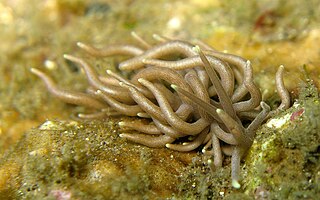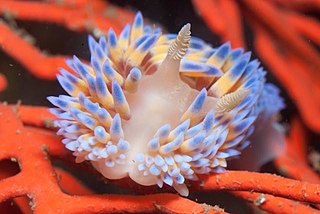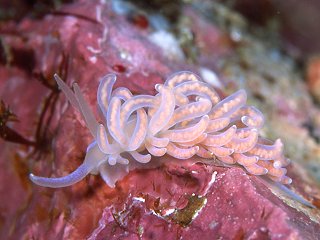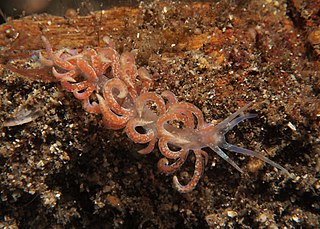
Phyllodesmium briareum is a species of sea slug, an aeolid nudibranch, a marine gastropod mollusc in the family Facelinidae.

Godiva quadricolor is a species of sea slug, a nudibranch, a shell-less marine gastropod mollusc in the family Facelinidae.

The purple lady nudibranch, Paraflabellina funeka, is a species of aeolid nudibranch, and is a very colourful sea slug. It is a marine gastropod mollusc in the family Flabellinidae.

Trinchesia speciosa, common name the "candy nudibranch", is a species of sea slug, an aeolid nudibranch, a marine gastropod mollusc in the family Trinchesiidae.

The frilled nudibranch, Leminda millecra, is a species of metarminid nudibranch, and is only found in South Africa. It is a marine gastropod mollusc in the family Charcotiidae.

The gasflame nudibranch is a very colourful species of nudibranch, or sea slug. It is a marine gastropod mollusc in the family Proctonotidae. Bonisa nakaza is the only species in the genus Bonisa.

Phyllodesmium is a genus of predatory sea slugs, aeolid nudibranchs, marine gastropod molluscs in the family Facelinidae.

Phyllodesmium serratum is a species of sea slug, an aeolid nudibranch, a marine gastropod mollusc in the family Facelinidae.

Phyllodesmium crypticum is a species of sea slug, an aeolid nudibranch, a marine gastropod mollusc in the family Facelinidae.
The black-dot nudibranch, Caloria sp. 1, as designated by Gosliner, 1987, is a species of sea slug, specifically an aeolid nudibranch. They are marine gastropod molluscs in the family Facelinidae.
Amanda armata, the night sky nudibranch, is a species of sea slug, specifically an aeolid nudibranch. It is a marine gastropod mollusc in the family Facelinidae.

Phyllodesmium rudmani is a species of sea slug, an aeolid nudibranch, a marine gastropod mollusc in the family Facelinidae.

Phyllodesmium colemani is a species of sea slug, an aeolid nudibranch, a marine gastropod mollusc in the family Facelinidae.
Phyllodesmium hyalinum is a species of sea slug, an aeolid nudibranch, a marine gastropod mollusc in the family Facelinidae.

Phyllodesmium macphersonae is a species of sea slug, an aeolid nudibranch, a marine gastropod mollusc in the family Facelinidae.

Phyllodesmium magnum is a species of sea slug, an aeolid nudibranch, a marine gastropod mollusc in the family Facelinidae.

Phyllodesmium opalescens is a species of sea slug, an aeolid nudibranch, a marine gastropod mollusc in the family Facelinidae.
Phyllodesmium pecten is a species of sea slug, an aeolid nudibranch, a marine gastropod mollusc in the family Facelinidae.
Pauleo jubatus is a species of sea slug, specifically an aeolid nudibranch. It is a marine gastropod mollusc in the family Facelinidae. It is the only species in the genus Pauleo.

Phyllodesmium poindimiei is an Alcyonacea feeding, aeolid nudibranch Gastropod belonging to the family Facelinidae. Cerata are important in this clade in terms of their physical defense and efficient metabolic processes. This species is spread sporadically along tropical coastal regions such as Australia, Hawaii, and the Indo-Pacific living in diverse marine habitats such as coral reefs. Unlike other species in the Opisthobranch Mollusca clade, P. poindimiei’s lush pink cerata are used for defensive purposes other than Nematocyst (dinoflagellate) capture and toxin release. Organismal ties within these thriving, tropical ecosystems can be determinants of environment change, which affects massive coral ecosystems. Continuously changing marine ecosystems, such as coral reefs, are directly linked to the evolution of organisms that live and thrive in the tropics such as the soft nudibrach P. poindimiei.














